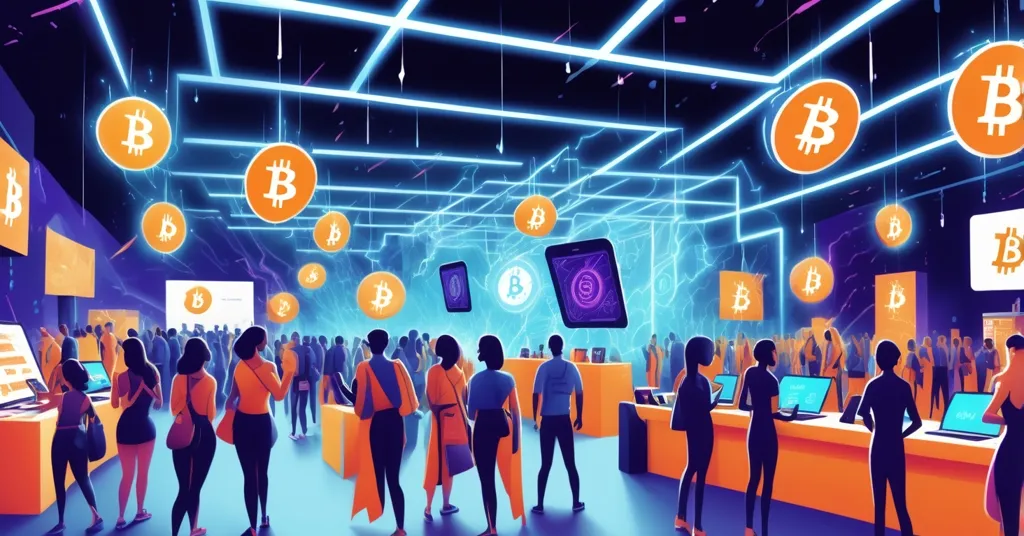Square Debuts Real-Time Bitcoin Payments at Bitcoin 2025 Conference in Vegas

Square Unveils Real-Time Bitcoin Payments at Bitcoin 2025 Conference
Square, a key player under Block, just dropped a bombshell at the Bitcoin 2025 conference in Las Vegas, rolling out real-time Bitcoin payments at a pop-up store. This isn’t just a stunt—it’s a bold move to prove Bitcoin can be more than digital gold, stepping into the ring as a legit everyday currency with the help of the Lightning Network.
- Live Demo: Square launches Bitcoin payments at a BTC Inc. pop-up during Bitcoin 2025 at The Venetian.
- Tech Edge: Lightning Network powers instant, low-cost transactions via QR code scans.
- Big Picture: Block eyes global rollout by 2026, targeting small businesses while navigating regulatory mazes.
Square’s Bitcoin Breakthrough at Bitcoin 2025
From May 27-29, 2025, The Venetian in Las Vegas buzzed with crypto enthusiasts at the Bitcoin 2025 conference, and Square stole the show. At a BTC Inc. merchandise truck, attendees could snag gear by scanning a QR code and paying with Bitcoin, with the transaction settling in a snap. Square handled the heavy lifting—real-time exchange rates, payment confirmations, and instant conversion to US dollars—making it feel as effortless as tapping a credit card. This isn’t a gimmick for tech nerds; it’s a proof-of-life for Bitcoin as a practical payment option, challenging the narrative that it’s just a speculative asset to HODL until the moon.
Lightning Network: Bitcoin’s Speed Boost
Let’s get to the nuts and bolts: Bitcoin’s main blockchain has long been a clunky beast for everyday use. Transactions can take 10 minutes or more to confirm, and fees skyrocket when the network’s jammed—hardly ideal for buying a coffee or a conference t-shirt. Enter the Lightning Network, a layer-2 solution that’s like an expressway bypassing the gridlock. It processes payments off the main chain, settling them instantly for pennies. Think of it as a shared tab at a bar—both parties pre-lock some funds in a “channel,” and transactions zip through until you close out. For Square’s point-of-sale setup, this is a game-changer, making Bitcoin payments rival Visa or PayPal in speed and cost.
But it’s not all sunshine. Lightning Network has quirks—merchants and users need enough funds in channels to cover transactions, which can be a hassle for the non-tech-savvy. If a party’s system goes offline, deals can stall. And for big-ticket items? You might still need the slow, pricey on-chain route. While adoption stats show Lightning growing (over 5,000 nodes and counting as of late 2024), it’s not a silver bullet yet. Still, for small, quick buys like at Bitcoin 2025, it’s a damn good start. For those curious about how Lightning enables merchant payments, it’s worth digging deeper.
Block’s Big Bet on Bitcoin
Block, Square’s parent outfit, isn’t just testing waters—they’re all in on Bitcoin, led by Miles Suter, their Bitcoin Product Lead since 2017. Suter’s mission is clear: position Bitcoin as the internet’s native currency, a decentralized, permissionless force to upend global finance. He’s been vocal about this vision in various interviews and statements, emphasizing how Bitcoin payment integration benefits merchants by saying small businesses “get paid faster, and get to keep more of their revenue” compared to the fee-hungry traditional processors.
Block’s strategy is a full toolkit, not a one-trick pony. Beyond Square’s payment tech, they’ve got Cash App for easy Bitcoin trading, Bitkey—a personal safe for your BTC you control yourself, not some shady exchange—with beefed-up privacy features hitting in May 2025, Spiral for open-source Bitcoin projects, and Proto building mining infrastructure. Each piece ties into the next, creating a loop from buying to holding to spending to mining. It’s a gutsy vision, rooted in the ethos of cutting out financial gatekeepers, something Jack Dorsey, Block’s co-founder and Bitcoin maximalist, has preached since stepping back from Twitter to double down on crypto. This isn’t just business; it’s a crusade for freedom and privacy through decentralization.
Merchant Adoption: Promise and Pitfalls
For small businesses, Square’s pitch is tempting. Over 1,000 sellers already use Block’s Bitcoin Conversion tool, launched in 2024, letting them hold BTC as an asset or flip it to dollars instantly to dodge volatility. Their Bitcoin stashes reportedly grew 70% in the past year, showing some are betting on the long game. Lower fees, faster settlements, and access to a global customer pool—imagine a mom-and-pop shop taking Bitcoin from a tourist halfway across the world without bank delays—are real wins. It’s a middle finger to the old financial system that often screws over the little guy. For more on Square’s Bitcoin adoption hurdles and perks, the data speaks volumes.
Yet, there’s friction. Even with instant fiat conversion, Bitcoin’s wild price swings can spook merchants. If customers aren’t paying in BTC—most still see it as a nest egg, not petty cash—why bother integrating? Plus, managing Lightning channels or explaining crypto to staff isn’t exactly plug-and-play for your average retailer. While Square’s smoothing the edges, adoption hinges on demand from the other side of the counter. If only 10% of Square’s 2 million sellers jump on board by 2026, though, that’s still a seismic ripple in commerce.
Global Ambitions and Regulatory Roadblocks
Block’s eyeing a global stage, with a phased rollout starting late 2025 and full access for eligible Square sellers by 2026. Sounds ambitious, but here’s the ugly truth: regulators are a brick wall. Bitcoin’s status is a patchwork mess—legal tender in El Salvador, banned in China, and a regulatory gray zone in the US and EU where bureaucrats are obsessed with stablecoins and tokenized fiat. Let’s be real: most policymakers aren’t losing sleep over Bitcoin’s point-of-sale dreams; they’re too busy playing whack-a-mole with crypto scams. Navigating this compliance jungle while educating merchants and users globally is a Herculean task. Block might have the tech, but politics could grind their gears to a halt. Check out the latest updates on Block’s ecosystem tools and global plans for a deeper look at their roadmap and challenges.
Counterpoint: Is Bitcoin Ready for Everyday Use?
Here’s where we play devil’s advocate. Bitcoin’s near all-time highs in 2025, and the “digital gold” mindset reigns supreme. Why spend your BTC on a hoodie when you’re banking on it buying a house someday? That’s the HODLer’s dilemma Block must crack, fighting a cultural tide of “stacking sats” over spending them. Unlike stablecoins like USDC, which peg to fiat for predictable value—perfect for cross-border payments on chains like Solana—Bitcoin’s volatility is a hard sell for daily transactions. Even with Lightning Network’s speed, consumer psychology leans toward hoarding, not spending. Could Square nudge behavior with discounts or rewards for BTC payments? Maybe, but it’s an uphill slog. Community reactions on platforms like Reddit about Square’s Bitcoin payments show mixed excitement and skepticism.
Then there’s the competition. While Block doubles down on Bitcoin, fintech giants like PayPal and Stripe hedge with altcoins, Ethereum-based solutions, and stablecoins. USDC on Solana, for instance, powers fast, cheap merchant transactions without the price rollercoaster. Ethereum’s DeFi ecosystem also offers payment integrations many merchants find more versatile. Is Block’s Bitcoin-only focus visionary or a stubborn blind spot? If stablecoins steal the transactional thunder, Block risks being the Betamax of crypto payments—innovative but obsolete. On the flip side, their purist stance aligns with Bitcoin’s core promise: a decentralized future free from fiat shackles. It’s a high-stakes gamble.
Looking Ahead: A Payments Revolution?
Square’s demo at Bitcoin 2025 feels like a throwback to PayPal’s early days—mocked as niche, then world-changing. Block’s merchant-first push screams decentralization, slashing reliance on bloated banks and giving power back to small players. But tech alone doesn’t win; people do. Convincing the masses to spend Bitcoin, not just hoard it, is the real battle. And let’s not pretend regulators will roll out the red carpet—expect a slugfest. Will Bitcoin ever truly replace your credit card, or is it doomed to stay a speculative darling? Block’s betting on the former, and their Vegas debut is a hell of a first punch. Whether it lands globally is the trillion-dollar question. Their tailored Bitcoin payment solutions for small businesses might just tip the scales.
One thing’s clear: we’re not here to shill BTC’s next moonshot. Our focus is adoption, not gambling. Square’s move isn’t a get-rich-quick scheme; it’s a gritty step toward a decentralized financial future. Let’s watch if this sparks a fire—or fizzles under the weight of reality.
Key Takeaways and Questions on Bitcoin Payments
- What’s the big deal about Square’s real-time Bitcoin payments at Bitcoin 2025?
It’s a hands-on push to make Bitcoin a practical currency for daily buys, proving it can match traditional payments with tech like the Lightning Network. - How does the Lightning Network enable this?
It handles transactions off Bitcoin’s main chain, cutting fees and speeding up settlements to mere seconds, ideal for quick purchases. - What tools does Block offer merchants for Bitcoin adoption?
Real-time checkout, instant conversion to dollars to sidestep volatility, the Bitcoin Conversion tool, and self-custody via Bitkey for secure holdings. - What challenges await Block’s global rollout by 2026?
Regulatory red tape across countries, Bitcoin’s price swings, and the need to educate both merchants and customers could slow progress. - Why is Block all-in on Bitcoin instead of stablecoins?
They see Bitcoin as the internet’s native, decentralized currency, prioritizing its freedom over the stability of fiat-tied alternatives. - Do small businesses gain from accepting Bitcoin?
Absolutely—lower fees, quicker payments, and global reach are perks, though volatility and weak consumer demand pose risks. - How does Block’s Bitcoin focus stack up against competitors?
Unlike PayPal or Stripe, who diversify with altcoins and stablecoins, Block’s Bitcoin-only bet is either a pioneering strike or a risky tunnel vision.



